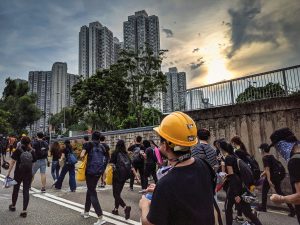You have probably heard this story before: A leader is deeply unpopular; their policy program including a crackdown in the name of national security is vehemently opposed by voters. Opposition parties put aside infighting and suddenly win by a landslide in local elections. The leader and the ruling party get scared; rather than face the prospect of a humiliating electoral defeat, they announce plans to delay elections citing a national emergency. In the meantime, they set about using security forces to arrest popular opposition leaders, media tycoons and activists.
We have grown sadly accustomed to the authoritarian playbook, but it still is a shock when a constitutional coup takes place in a developed, rule of law society – and even more so in one of the world’s leading financial hubs. Hong Kong provides a warning for the world’s embattled liberal democracies.
Like Viktor Orban in Hungary, the Chinese Communist Party has used the COVID-19 crisis to suspend civil liberties and freedoms in Hong Kong. The National Security Law supersedes Hong Kong’s constitutional safeguards for human rights, paving the way for a purge of academia, the press, public libraries, and politics.
While the mass arrest of the senior leadership of Apple Daily is rightly in the headlines, the postponement of the Legislative Council elections paved the way and therefore also deserves scrutiny.
Hong Kong Chief Executive Carrie Lam’s announcement that the Legislative Council elections due in September would be postponed for a year, swiftly following the disqualification of 12 opposition candidates on spurious grounds, has left a bitter taste in the mouth of those who support democracy in the city.
The United States’ second president, John Adams, famously said that, “facts are stubborn things” and the facts are not on the embattled chief executive’s side. Since COVID-19 expanded beyond the confines of China’s borders to become a global pandemic, dozens of countries have held elections safely and successfully including France, Poland, Belarus, North Macedonia, Serbia, and Croatia. Even just in the Asia-Pacific region, there have been elections amid the pandemic in Japan, Mongolia, South Korea, Singapore, and Sri Lanka.
In many of these countries the daily and total COVID-19 case numbers were higher on the day they held their respective elections than the current daily and total case numbers in Hong Kong. When Singapore held its parliamentary elections on July 10, its daily COVID-19 case number was four times higher than Hong Kong’s currently is. For Poland, which recently held two rounds of presidential elections, its daily COVID case number was twice the size of Hong Kong’s.
What’s more, Hong Kong’s COVID-19 infection rate is currently dropping. Since Lam’s announcement of postponement on July 31, daily case numbers have dropped below 100 and continue to fall. It could well be the case that by the time the original date that the Legislative Council elections was meant to take place comes around, Hong Kong has a lower daily case number than most of Europe and North America.
Dispelling the myth that Hong Kong’s public health crisis is insurmountable compared to other countries reveals the postponement for the transparent ploy that it is: A desperate attempt by the chief executive to buy time for security officials to marginalize and silence pro-democracy activists within the city.
The arrests of Jimmy Lai and others were only possible because the elections were cancelled. Any election weeks after a dozen popular figures found themselves politically purged would have guaranteed a democratic landslide. But remove public accountability and the government can act with impunity.
The international community has rightly responded to this postponement with criticism and concern, demanding that elections are held as close to the original date as possible. It must now go further, starting by increasing its material support for the pro-democracy movement and civil society in Hong Kong through the work of consulates and embassies, the creation of more targeted lifeboat schemes to help activists who need a lifeline, and the adoption of targeted sanctions for Carrie Lam and the Communist Party officials who continue to have their knee on the city’s neck.
Lam’s public health postponement of the polls must be exposed for the cynical farce that it is.
Johnny Patterson is the director of Hong Kong Watch. Sam Goodman is the senior policy advisor of Hong Kong Watch.

































